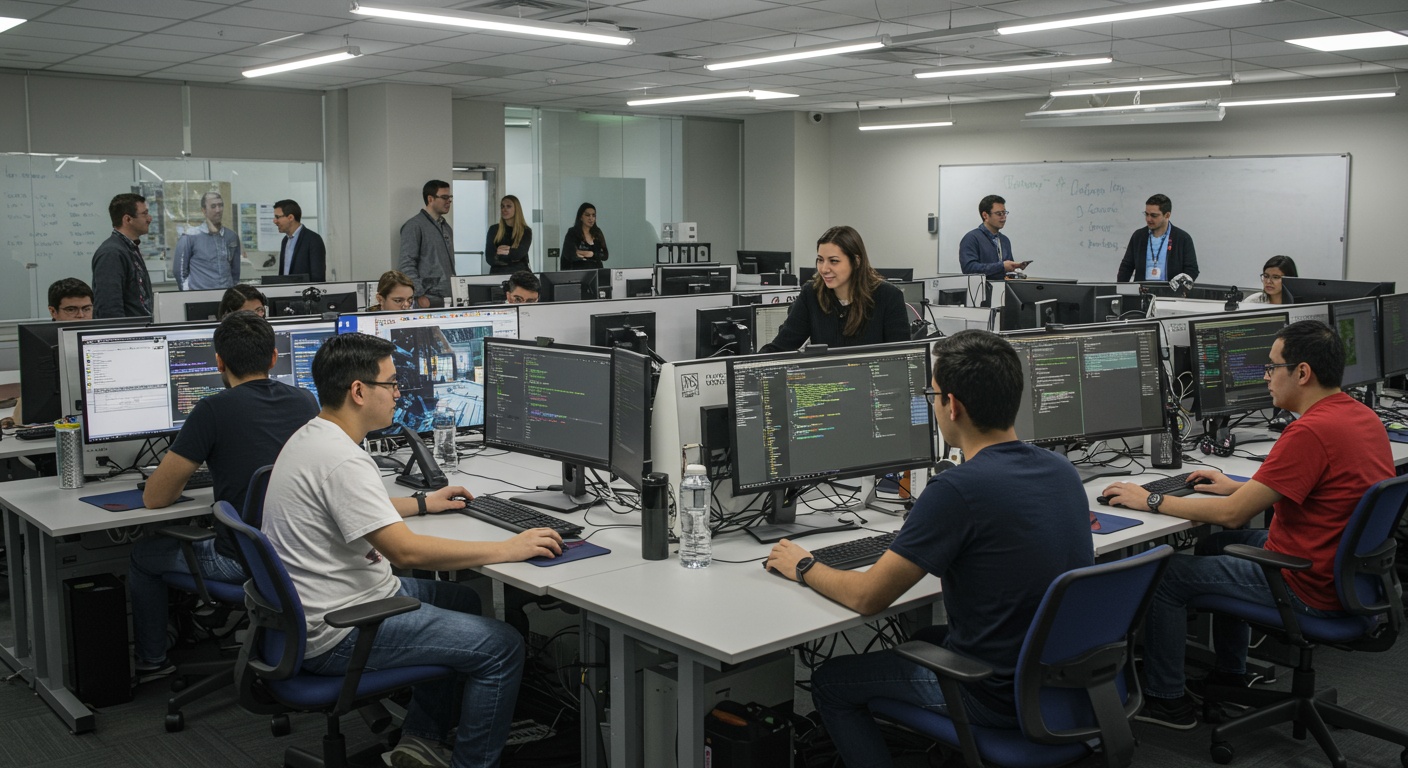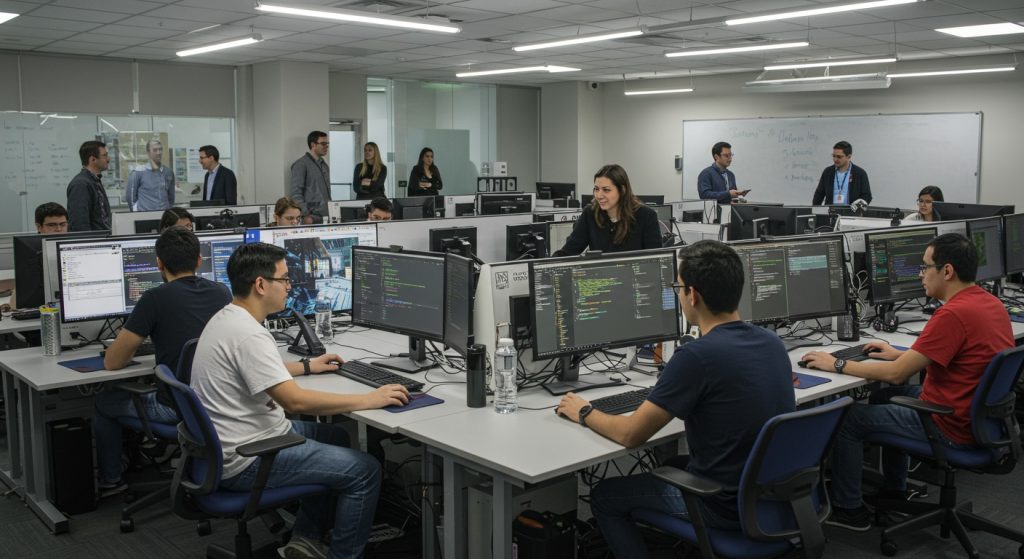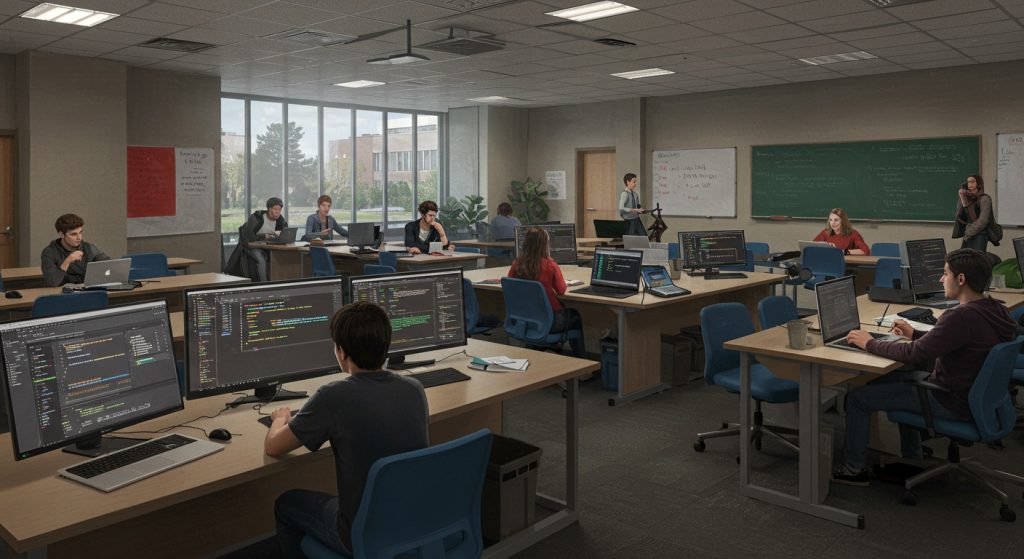Landing a dream Computer Science role increasingly demands real-world experience, making industry placements crucial. Forget theoretical knowledge alone; employers seek graduates who can immediately contribute. The surging demand for AI specialists, cybersecurity experts. Full-stack developers underscores this need. Choosing the right college significantly impacts placement opportunities. We will explore institutions excelling in connecting students with leading tech companies. Factors considered include internship programs, industry partnerships, project-based learning. Alumni networks. Get ready to uncover the top Computer Science programs that prioritize your career launch.

Why Industry Placements Matter for Computer Science Students
Industry placements, often called internships or co-ops, are structured work experiences that allow students to apply their classroom knowledge in a real-world setting. For Computer Science students, these placements are invaluable for several reasons:
- Practical Skill Development: Textbooks teach theory. Industry placements teach practical skills. Students learn how to write production-level code, work in teams. Troubleshoot complex problems. For example, a student might learn about data structures in class. During a placement, they might implement a specific data structure to optimize a database query.
- Career Exploration: Placements provide a risk-free way to explore different career paths within Computer Science. A student interested in software engineering might discover a passion for data science during a placement at a data analytics firm. Or, they might realize they prefer front-end development over back-end development.
- Networking Opportunities: Placements allow students to build connections with industry professionals. These connections can lead to future job opportunities, mentorship. Valuable career advice. Attending industry events while on placement can also expand a student’s network.
- Increased Employability: Graduates with industry placement experience are significantly more employable. Employers value practical experience and the ability to hit the ground running. A student who has already worked on a real-world project is more attractive than a student with only academic qualifications.
- Earning Potential: Many industry placements are paid, providing students with a source of income to help offset the costs of their education. Even unpaid placements offer invaluable experience that translates into higher earning potential after graduation.
Key Criteria for Evaluating Computer Science Programs with Strong Industry Placement Records
When evaluating Computer Science programs, consider the following factors to determine the strength of their industry placement programs:
- University Reputation and Rankings: While rankings aren’t everything, they can provide a general indication of a program’s quality and resources. Look for universities with strong reputations in Computer Science, particularly those known for their research output and industry connections.
- Placement Rates: What percentage of Computer Science students secure industry placements? A high placement rate indicates a strong program with established relationships with employers. Ask for specific placement data, not just general claims.
- Placement Locations: Where are students placed? Are they placed at reputable companies in desirable locations? A program that places students at leading tech companies is a strong indicator of its quality.
- Program Structure and Support: Does the university offer dedicated career services to help students find and prepare for placements? Do they provide workshops on resume writing, interviewing skills. Networking? Is there a dedicated placement coordinator who works with employers to secure opportunities?
- Curriculum Relevance: Does the Computer Science curriculum align with industry needs? Does it cover in-demand technologies and programming languages? A curriculum that is updated regularly to reflect the latest trends in the field is crucial.
- Industry Partnerships: Does the university have strong partnerships with industry? Do companies actively recruit students from the program? Do they participate in career fairs and on-campus events?
- Alumni Network: A strong alumni network can provide valuable support to students seeking placements and jobs. Are alumni actively involved in recruiting and mentoring current students?
Top Universities Known for Computer Science and Industry Placements
While specific rankings and program details change frequently, the following universities are consistently recognized for their strong Computer Science programs and industry placement opportunities. This is not an exhaustive list. The best choice for an individual student will depend on their specific interests and goals.
- Massachusetts Institute of Technology (MIT): MIT’s Computer Science program is renowned for its cutting-edge research and strong industry connections. Students have access to a wide range of internship opportunities at leading tech companies and research labs.
- Stanford University: Located in the heart of Silicon Valley, Stanford offers unparalleled access to the tech industry. Its Computer Science program is highly selective. Students who are admitted benefit from a world-class faculty and a vibrant entrepreneurial ecosystem.
- Carnegie Mellon University (CMU): CMU’s School of Computer Science is consistently ranked among the best in the world. Its rigorous curriculum and focus on practical skills make its graduates highly sought after by employers. CMU has a strong tradition of industry collaboration and offers numerous internship opportunities.
- University of California, Berkeley (UC Berkeley): UC Berkeley’s Computer Science program is known for its breadth and depth. Students can specialize in a variety of areas, including artificial intelligence, machine learning. Cybersecurity. Berkeley’s location in the Bay Area provides access to a wide range of internship and job opportunities.
- California Institute of Technology (Caltech): Caltech’s Computer Science program is smaller and more focused than some of the other programs on this list. It is highly selective and offers a rigorous academic experience. Caltech’s strong research focus and close ties to the Jet Propulsion Laboratory (JPL) provide unique opportunities for students interested in aerospace and robotics.
- University of Waterloo (Canada): The University of Waterloo is renowned for its co-op program, which integrates paid work experience into the academic curriculum. Computer Science students at Waterloo complete six co-op terms, gaining valuable experience at a variety of companies. Waterloo’s co-op program is highly competitive. It provides students with a significant advantage in the job market.
- University of Oxford (UK): Oxford’s Department of Computer Science is a world-leading center for research and teaching. Its graduates are highly sought after by employers in a variety of industries. Oxford offers a range of internship opportunities, both in the UK and abroad.
- ETH Zurich (Switzerland): ETH Zurich is one of the leading science and technology universities in the world. Its Department of Computer Science offers a rigorous academic program and strong industry connections. ETH Zurich’s location in Switzerland provides access to a vibrant tech ecosystem.
Leveraging University Resources for Securing Industry Placements
Universities offer a variety of resources to help Computer Science students secure industry placements. It is essential to take advantage of these resources to maximize your chances of success:
- Career Services: Career services departments provide resume and cover letter workshops, mock interviews. Job search assistance. They also organize career fairs and networking events. Make an appointment with a career advisor early in your academic career to discuss your goals and develop a plan for securing a placement.
- Departmental Resources: Many Computer Science departments have their own career advisors or placement coordinators who specialize in the field. These advisors can provide tailored advice and guidance based on your specific interests and skills.
- Faculty Connections: Professors often have strong connections with industry. Attend office hours, participate in research projects. Build relationships with faculty members. They may be able to connect you with internship opportunities or provide letters of recommendation.
- Alumni Network: Connect with alumni through LinkedIn or university alumni events. Alumni can provide valuable insights into different companies and industries. They may also be able to offer advice on the application and interview process.
- Online Job Boards: Utilize university-specific job boards and online job boards like LinkedIn, Indeed. Glassdoor to search for internship opportunities.
- Networking Events: Attend career fairs, industry conferences. Other networking events to meet recruiters and learn about potential internship opportunities. Practice your elevator pitch and be prepared to talk about your skills and interests.
Building a Strong Portfolio for Industry Placement Applications
A strong portfolio is essential for showcasing your skills and experience to potential employers. Here are some key components of a successful portfolio:
- Personal Website: Create a personal website to showcase your projects, skills. Experience. Include a professional headshot, a brief biography. Links to your GitHub profile and LinkedIn profile.
- GitHub Profile: Use GitHub to showcase your coding skills and contributions to open-source projects. Contribute to existing projects or create your own. Ensure your code is well-documented and easy to interpret. Understanding version control using Git is a fundamental skill in modern software development.
- Personal Projects: Develop personal projects to demonstrate your skills and interests. Choose projects that are relevant to the type of roles you are seeking. For example, if you are interested in machine learning, create a project that uses machine learning algorithms to solve a real-world problem.
- Course Projects: Include relevant course projects in your portfolio. Highlight the skills and technologies you used and the results you achieved.
- Certifications: Consider obtaining relevant certifications to demonstrate your knowledge and skills in specific areas. For example, you might consider a certification in cloud computing or data science.
- Blog Posts: Write blog posts about your projects or technical topics you are passionate about. This demonstrates your ability to communicate technical concepts clearly and effectively.
- Resume and Cover Letter: Tailor your resume and cover letter to each specific internship opportunity. Highlight your relevant skills and experience and explain why you are a good fit for the role.
Navigating the Industry Placement Application Process
The industry placement application process can be competitive. By following these tips, you can increase your chances of success:
- Start Early: Begin your search for placements early in the academic year. Many companies begin recruiting months in advance.
- Research Companies: Research companies that interest you and tailor your application to their specific needs. Grasp their mission, values. Culture.
- Network: Attend career fairs and networking events to meet recruiters and learn about potential opportunities.
- Prepare for Interviews: Practice answering common interview questions. Be prepared to discuss your skills, experience. Projects. Research the company and the role beforehand. Be ready to answer technical questions related to Computer Science concepts like data structures, algorithms. Software design principles.
- Follow Up: Send a thank-you note to the interviewer after each interview.
- Be Persistent: Don’t get discouraged if you don’t get every placement you apply for. Keep applying and refining your application materials.
The Role of Emerging Technologies in Computer Science Placements
The Computer Science landscape is constantly evolving. Industry placements often provide students with opportunities to work with emerging technologies. Some key areas to consider include:
- Artificial Intelligence (AI) and Machine Learning (ML): AI and ML are transforming industries across the board. Placements in this area might involve developing machine learning models, working with natural language processing, or building AI-powered applications. Understanding concepts like neural networks, deep learning. Different machine learning algorithms is crucial.
- Cloud Computing: Cloud computing is essential for modern software development and deployment. Placements in this area might involve working with cloud platforms like AWS, Azure, or Google Cloud, developing cloud-native applications, or managing cloud infrastructure. Familiarity with containerization technologies like Docker and orchestration tools like Kubernetes is highly valuable.
- Cybersecurity: With the increasing threat of cyberattacks, cybersecurity is a critical area of focus. Placements in this area might involve conducting security audits, developing security tools, or responding to security incidents. Understanding network security, cryptography. Ethical hacking is vital.
- Data Science and Big Data: Data science involves extracting insights from large datasets. Placements in this area might involve working with big data technologies like Hadoop and Spark, developing data visualizations, or building data pipelines. Knowledge of statistical analysis and data mining techniques is essential.
- Blockchain Technology: Blockchain technology is revolutionizing various industries, including finance and supply chain management. Placements in this area might involve developing blockchain applications, working with smart contracts, or researching new blockchain technologies.
Examples of Real-World Applications Learned During Placements
Industry placements provide students with the opportunity to apply their Computer Science knowledge to real-world problems. Here are some examples:
- Developing a Mobile App for a Healthcare Provider: A student might develop a mobile app that allows patients to schedule appointments, access medical records. Communicate with their doctors. This project would involve skills in mobile development, user interface design. Database management.
- Building a Recommendation System for an E-commerce Website: A student might build a recommendation system that uses machine learning algorithms to suggest products to customers based on their past purchases and browsing history. This project would involve skills in machine learning, data analysis. Software engineering.
- Creating a Cybersecurity Tool to Detect Network Intrusions: A student might develop a tool that monitors network traffic for suspicious activity and alerts security personnel to potential threats. This project would involve skills in network security, programming. Data analysis.
- Optimizing a Database for a Large Financial Institution: A student might work on optimizing the performance of a large database used to store financial transactions. This project would involve skills in database management, query optimization. Performance tuning.
- Developing a Simulation for a Logistics Company: A student might develop a simulation that models the flow of goods through a supply chain. This simulation could be used to optimize logistics operations and reduce costs. This project would involve skills in simulation modeling, data analysis. Software engineering.
The Future of Computer Science Education and Industry Placements
The future of Computer Science education will likely involve even greater integration of industry placements. As technology continues to evolve at a rapid pace, it is becoming increasingly crucial for students to gain practical experience alongside their academic studies.
- Increased Emphasis on Experiential Learning: Universities are increasingly recognizing the value of experiential learning and are incorporating more industry placements, internships. Co-ops into their Computer Science programs.
- More Collaboration Between Universities and Industry: Universities are working more closely with industry to develop curricula that are aligned with industry needs and to provide students with relevant skills and knowledge.
- Greater Use of Technology in Education: Technology is being used to enhance the learning experience and to provide students with more opportunities for hands-on learning. Virtual reality, augmented reality. Simulations are being used to create immersive learning environments.
- Focus on Lifelong Learning: The pace of technological change requires Computer Science professionals to be lifelong learners. Universities are providing students with the skills and knowledge they need to adapt to new technologies and to continue learning throughout their careers.
Conclusion
Choosing the right computer science program with strong industry placements is a pivotal decision. Hopefully, this guide has illuminated your path. Remember, it’s not just about prestige; it’s about finding a program that resonates with your specific career aspirations. My advice, drawn from years of observing successful graduates, is to actively engage with industry placement opportunities. Don’t just passively participate; network, seek mentorship. View each placement as a stepping stone toward your dream role. The tech landscape is constantly evolving, so continuous learning is key. Embrace online courses, attend workshops. Stay curious. Ultimately, your dedication and proactive approach will be the most significant factors in shaping your future success. Your journey starts now. The possibilities are limitless.
More Articles
Best Computer Science Programs in Germany for International Students
Leading Computer Science Programs In Canadian Universities
Top Engineering Universities in the UK for Innovation
Top Engineering Universities Across Europe For International Students
FAQs
Okay, so what actually makes a computer science program ‘best’ when I’m looking for industry placements?
That’s a great question! It’s not just about rankings, though those can be a starting point. Look for schools with strong industry connections – think lots of partnerships with tech companies for internships and research. Check out the career services offered; are they proactive in helping students find placements? Also, consider the curriculum. Does it include practical, hands-on experience that employers value, not just theoretical knowledge?
I’ve heard some colleges practically guarantee internships. Is that for real. Should I be wary?
While ‘guarantee’ is a strong word, some colleges have well-established co-op programs that are structured internships built into the degree. These are fantastic! But, be wary of programs that promise internships but don’t have a proven track record or strong industry ties. Do your research and see what actual students say about their placement experiences.
What if a college isn’t a ‘top 10’ school. Has amazing local tech companies nearby? Is it still worth considering?
Absolutely! Location, location, location! Being near a tech hub can be a HUGE advantage. Even if the school isn’t nationally ranked in the top tier, proximity to companies like Google, Amazon, or even smaller startups can open doors for internships, networking. Even full-time job offers after graduation. Don’t discount a school based solely on rankings if it’s situated in a prime location.
What kind of coursework or extracurriculars should I look for that’ll really impress companies during placements?
Think beyond just the core CS classes. Look for opportunities to get involved in projects, hackathons. Research. Experience with in-demand technologies (like cloud computing, AI/ML, cybersecurity) is a huge plus. Contributing to open-source projects or having a personal portfolio showcasing your skills will also set you apart. , show them you’re not just learning the theory. You can actually build things.
Are industry placements only for coding jobs? What if I’m interested in other areas of CS, like UX or data science?
Nope, placements aren’t just for coding! A good CS program with strong industry ties will have placements in a variety of areas. Look for colleges that have specific tracks or specializations in UX/UI, data science, cybersecurity, or other areas you’re interested in. Make sure they also have partnerships with companies in those specific fields.
How much does it really matter if a college has a ‘name brand’ reputation?
A prestigious name can definitely open some doors initially, especially for that first internship. But, your skills, portfolio. Interview performance ultimately matter more. A strong candidate from a lesser-known school can absolutely outshine someone from a ‘top’ school if they have the right experience and can demonstrate their abilities. Don’t get hung up on the name; focus on finding a program that provides you with the skills and opportunities you need to succeed.
Besides cost and location, what are some other less obvious things I should think about when choosing a college for CS with placements?
Think about the faculty! Are they actively involved in research? Do they have industry experience? A professor with connections can be an invaluable resource for finding placements. Also, consider the size of the program. Smaller programs can sometimes offer more personalized attention and support. Finally, check out the alumni network – a strong alumni network can provide mentorship and job opportunities down the road.



